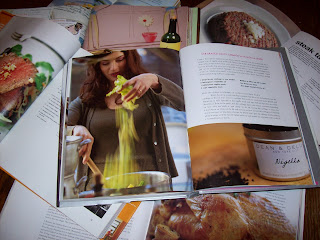
I love to read cookbooks. It's a hobby I inherited from my mother, and she from hers. If I close my eyes and think about my mom my first thought is of her sitting in the living room on a sunny morning with a cup of coffee in hand and a cookbook on her lap.
Cookbooks are fun to read because they provide inspiration. I like to spend a Sunday morning thinking about what I'm going to cook for dinner that evening. Does that seem strange? Well, it shouldn't. After all, don't other artists often use books to find their inspiration?
Like other texts, cookbooks are not all created equal. First of all, some don't have pictures. This, I find ridiculous. Every good cook knows that we eat with our eyes first. As an avid reader, I am accustomed to using my imagination, but for me, a cookbook without pictures just will not do. Second, the language used often varies. For example, in the picture above you will see one of my favorite domestic goddesses, Nigella Lawson, stirring cabbage into a pot. Nigella employs a relaxed voice in her writings. She advises readers to, "put the oil in a pan with the garlic and anchovies and cook over a low heat until you have a melted, muddy mess." Or, "cook the salmon over medium-high heat until just cooked through, and remove them to warmed plates while you get on with the vegetables." To me these directions are understandable. After reading, I would get out my non-stick, put in a teaspoon or so of oil and cook the salmon on each side for about five minutes. I would then use an oven-mit to remove the plate that I had previously put in a 200 degree oven (because I read ahead, of course) and, using a rubber, not metal spatula, place the salmon on it. Is that what you would do? Is that what your dad would do? How about your average fifteen year old?
Nigella knows her audience. She is aware that if you purchased her book, you've probably been cooking for a while. That, or you don't ever plan on cooking, but enjoy her writing style. Even though her directions are very straight-forward, they are not thorough. Thus, they are not written for beginners.
Additionally, cookbooks use other language that may be confusing for newbies. For example, do you know the difference between a dice, a chop, and a slice? How about a cup of almonds, chopped, versus a cup of chopped almonds? There is a difference, and not knowing it could seriously alter a recipe.
My point is, like the textbooks we've been analyzing, cookbook writers don't all use the same language. Like in our content areas, there is universal language that cooks should learn before diving into a recipe. However, the way this vocabulary is presented and used is going to be different with all authors.
In conclusion, when shopping for cookbooks (textbooks), cooks (teachers) should search for books with tantalizing pictures (good visuals that accompany learning), and language that makes sense to the reader.

No comments:
Post a Comment